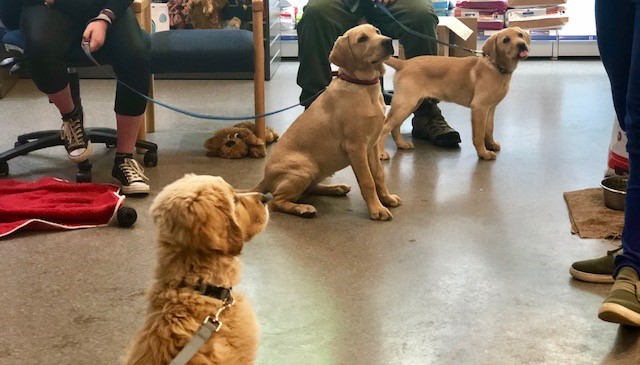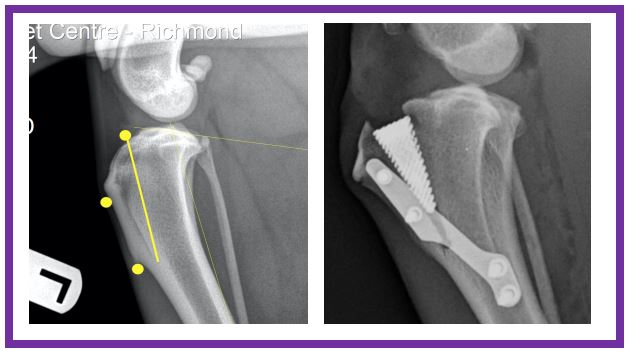Socialisation; why is it crucial for your puppy? Puppies go through the same developmental stages…

Your New Puppy
Your puppy should have received its first vaccination together with a physical check up before re-homing; you should have received a vaccination certificate as proof of this. If this has not been done please book for an appointment straight away.
Boosters are required every 3-4 weeks until your puppy is over 14 weeks of age. Full immune protection cannot be relied upon until a week after the final booster.
The diseases we routinely vaccinate against include Canine Parvovirus, Canine Distemper, Infectious Canine Hepatitis.
Further vaccinations for Leptospirosis and Kennel Cough are also available
Boosters are essential to maintain your dog’s immunity to these serious diseases. These are required annually for Leptospirosis and Kennel Cough; and biannually for Parvovirus, distemper and Hepatitis
What to expect at your puppy’s first visit to the Vet Centre.
At the Vet Centre we want your puppy’s first visit (and every other visit) to us to be a positive experience
When you arrive at the Vet Centre, your puppy will be weighed. They will then have a consultation with the vet, where they will have a full and thorough check-over.
Any queries or problems you may have regarding your puppy can be answered at this time.
Once your puppy is found to be healthy they will be vaccinated. This is done as a small injection under the skin. Your vet will advise you on the best vaccination protocol for your puppy, they will likely need a booster a few weeks later
The vet may ask what worm and flea treatment your puppy has had, and if needed these may also be administered. Microchipping may also be done at this time.
SOCIALISATION
Good socialisation ensures that your puppy develops into a dog that is well behaved with yourself, your family, other humans and animals.
The most important period for socialising puppies is between 8 – 16 weeks of age. Once your puppy is fully vaccinated it is important that you take your puppy out to meet other puppies, adult dogs and also people of all ages – especially children. It is also important to expose your puppy to all kinds of environments, novel things and experiences, in a non-threatening way. This will make the puppy confident and enable it to cope with normal everyday things, including noises, smells, water, other animals, strangers and even vets.
Puppy Playcentre is a fun way to help you socialise your puppy, helping it to develop those social skills it will need for the rest of its life.
The goal of our classes is to help produce a well socialised, happy, confident and obedient dog.
It is important that what we teach them at this early stage results in a well-behaved and socially acceptable adult pet. By starting now, we can prevent bad habits and teach our pets good manners in a fun and friendly environment.
If your puppy has had its first vaccination and is less than 16weeks old, we would like to have you join our next puppy class.
Please contact us for a registration form.
Worms are a common cause of ill health in dogs and can cause symptoms ranging from poor condition, loss of appetite, pot belly, vomiting and diarrhoea, coughing, anaemia and even death.
Four worm types in New Zealand – round worms, hookworms, whipworms and tapeworms, affect dogs.
Puppies should be treated with an fortnightly from 4 weeks until 12 weeks, monthly until 6 months, then every 3 months for the rest of its life.
Fleas are a common problem, particularly in summer, but are an issue all year round. As well as carrying tapeworms, fleas are very irritating for dogs, and can cause an allergic dermatitis. Effective flea control requires the use of products that are non-toxic, convenient to use and effective at breaking the flea breeding cycle.
Ensure any flea product you use on your puppy is safe for use on young animals. If you are unsure, please ask our staff.
NUTRITION & FEEDING
Proper development of the teeth, bones, internal organs etc relies upon supply of the correct balance of nutrients and hence depends greatly on the quality of the diet.
It is important that you choose the correct type of diet for the life stage and also the size of your dog. Puppies require more protein, energy and minerals than an adult dog, and it is important to feed them a suitable puppy food during the first year. Large breed puppies (greater than 25kg expected adult weight) can suffer from certain skeletal problems associated with fast growth rates and to minimise this there are special diet for large breeds.
Premium foods (such as Eukanuba and Hills) are made of high quality ingredients; providing your pet with the best nutrition. Smaller amounts of these foods are needed for daily nutrition so it is important to follow the recommendations on the packaging as to how much of the product to feed. This is a guideline only; you can vary this to your own dogs needs by assessing their body condition.
Ideal body condition is when you can easily feel the ribs with gentle pressure but cannot see the ribs. If you are unsure, ask a member of our staff to help you.
As a general rule we recommend feeding three meals a day from the age of eight weeks. This can be reduced to two meals at the age of twelve weeks or earlier if the puppy starts to leave food after a meal or shows disinterest in food. From sixteen weeks of age the puppy can be fed just once daily though twice daily feeding for life is ok too.
Remember fresh water should be available at all times.
EXERCISE
You will need to choose a suitable collar. Remember to check the adjustment regularly as puppies grow fast. You should always be able to insert two fingers easily beneath the collar.
Other alternatives for lead training are available including; haltis, harnesses & check chains. Talk to our staff about what is best for your puppy.
Once venturing outside the house you should keep your puppy under control at all times and you must be sure you can call your puppy back to you before letting off the lead in public places. The use of a long retractable lead allows the puppy some freedom whilst it is still in training.
For the first 3 – 4 months of your puppy’s life it will get most of its exercise from playing around the house and walks are not strictly necessary. However, once your puppy is fully vaccinated short daily walks are very useful to help socialise your puppy with other dogs, people, animals, traffic and other sights and sounds encountered outside.
It is important not to overdo a young dogs exercise to avoid their bones prematurely stop growing or becoming deformed. When a dog reaches its full size, the bones stop growing and amount of exercise can safely be increased. This is generally around 12 months
Adult dogs need a exercising for at least half an hour a day and this can include some time off lead. The more athletic the breed the more exercise they will require. Try to vary the exercise so that the dog does not become bored.
REGISTRATION
By law, all dogs over the age of three months must be registered with Animal Control and are required to wear a registration tag when in a public area.
Visit your local council.
Microchipping is a local council requirement for all new puppies being registered.
It can be done during a normal consultation or vaccination.
DESEXING
Unless you are serious about showing or breeding your dog, desexing is recommended, and has far more advantages than disadvantages.
Owners are often tempted to have at least one litter from a bitch, believing that having a litter will improve temperament. There is no evidence to support this theory.
Breeding is an expensive and time-consuming process, which requires a lot of hard work.
The advantages of desexing are:
- Reduces wandering in the male and female
- Reduces diseases and cancer of the prostate
- Mammary cancer, a relatively common disease can largely be prevented by desexing the bitch. To gain this advantage it is important to have the bitch desexed before her first heat. For this reason we recommend desexing bitches at 6 months of age, decreasing the chances of mammary cancer by a 70%.
- The bitch will not have any unwanted puppies or phantom pregnancies
-
- Prevents pyometra, a serious, toxic infection of the uterus, which usually requires an emergency operation to save the bitch’s life
The disadvantages of desexing are:
- You will not be able to breed from your dog.
- A small number of female dogs become incontinent later in life. This is easily treated
It is a common fallacy that a desexed dog will become fat and lazy. Remember that all service animals, Guide dogs, Hearing dogs and dogs for the Disabled are routinely desexed. Feeding of a quality diet without excessive titbits should adequately control any problems of weight gain, just as it does in the entire animal.
Both dogs and bitches are usually desexed at about 6 months of age although the operation can be carried out at any time. Any of our staff will be more than happy to discuss the details with you.
We recommend that you think seriously about how you would cope financially in a situation where expensive surgery or long term treatment is necessary for your puppy. The companies in New Zealand that offer pet medical insurance offer a variety of plans ranging from very basic to very comprehensive cover. Be sure you know what you are getting for your premium. To find out more about insurance visit https://www.southerncrosspet.co.nz/


